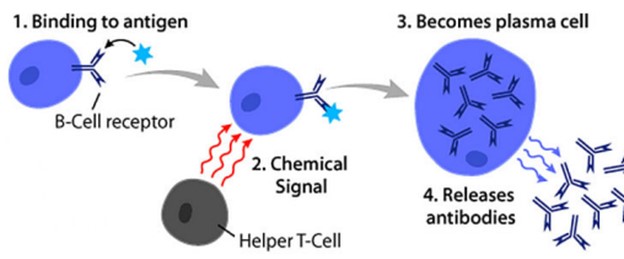Which of the following types of cells produce and release antibodies?
Natural killer cells.
Cytotoxic T-cells.
Plasma B cells.
Helper T-cells.
The Correct Answer is C
Antibodies are produced by specialized white blood cells called B lymphocytes (or B cells).
When an antigen binds to the B-cell surface, it stimulates the B cell to divide and mature into a group of identical cells called a clone.
The mature B cells, called plasma cells, secrete millions of antibodies into the bloodstream and lymphatic system.

Choice A, Natural killer cells, is not the correct answer because natural killer cells are a type of white blood cell that play a major role in the host-rejection of both tumours and virally infected cells.
Choice B, Cytotoxic T-cells, is not the correct answer because cytotoxic T-cells are a type of white blood cell that kills cancer cells, cells that are infected (particularly with viruses), or cells that are damaged in other ways.
Choice D, Helper T-cells, is not the correct answer because helper T-cells are a type of white blood cell that plays an important role in the immune system by helping other white blood cells fight infections.
Nursing Test Bank
Naxlex Comprehensive Predictor Exams
Related Questions
Correct Answer is B
Explanation
Diffusion down a concentration gradient causes most of the carbon dioxide from the blood to move into the alveoli.
The alveoli are tiny air sacs in the lungs where gas exchange occurs.
Carbon dioxide is a waste product of cellular respiration and is carried by the blood to the lungs to be exhaled.
In the lungs, carbon dioxide diffuses from the blood (where its concentration is high) into the alveoli (where its concentration is lower) down its concentration gradient.
Choice A is incorrect because carbon dioxide is not converted to carbon monoxide in the body.
Choice C is incorrect because passive transport using carrier proteins is not the primary mechanism by which carbon dioxide moves from the blood into the alveoli.
Choice D is incorrect because active transport using energy is not involved in the movement of carbon dioxide from the blood into the alveoli.
Correct Answer is A
Explanation
Melanin is a pigment produced by cells called melanocytes in the skin.
It protects the skin from ultraviolet (UV) radiation by absorbing and dissipating over 99.9% of absorbed UV radiation.
This helps to prevent DNA damage and other adverse effects of UV radiation on the skin.
Choice B. Perspiration is not correct because it is a fluid produced by sweat glands in the skin that helps to regulate body temperature, but it does not protect the skin from UV radiation.
Choice C. Sebum is not correct because it is an oily substance produced by sebaceous glands in the skin that helps to lubricate and protect the skin, but it does not protect the skin from UV radiation.
Choice D. Keratin is not correct because it is a fibrous protein that provides strength and durability to the skin, hair and nails, but it does not protect the skin from UV radiation.
Whether you are a student looking to ace your exams or a practicing nurse seeking to enhance your expertise , our nursing education contents will empower you with the confidence and competence to make a difference in the lives of patients and become a respected leader in the healthcare field.
Visit Naxlex, invest in your future and unlock endless possibilities with our unparalleled nursing education contents today
Report Wrong Answer on the Current Question
Do you disagree with the answer? If yes, what is your expected answer? Explain.
Kindly be descriptive with the issue you are facing.
